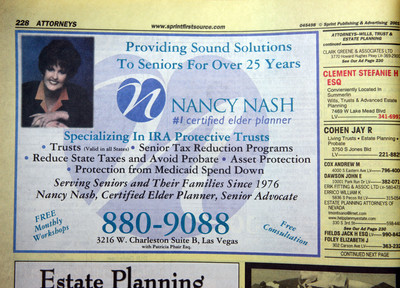Trend among cases criticized
A lawsuit brought against Boulder City medical malpractice attorney Hamilton Moore, by a former client, was sealed from public view by a judge after it was filed in May 2003.
Three years later, Moore voluntarily surrendered his law license after allegations surfaced that he had kept from clients $300,000 in settlements, according to the State Bar of Nevada. Had a judge not kept the earlier lawsuit against Moore hidden, might subsequent clients have found out about the dispute and chosen a different lawyer?
Moore was not the only attorney who persuaded a judge to keep his legal squabbles shielded from public view between 2000 and late 2006, according to court records.
A review of at least 115 lawsuits that District Court judges sealed shows that attorneys or law firms were named defendants or plaintiffs in 20 percent of the cases, even though the region's 4,743 licensed attorneys represent a fraction of 1 percent of Clark County's population.
Physicians and medical companies were the only other clients with nearly as many sealed lawsuits.
The trend leaves a perception of favoritism, secrecy and inappropriate connections between lawyers and the judges who rule on their cases.
"The idea that the entire case should be sealed is counter to the general expectation that litigation be open and public," said Jean Sternlight, a law professor at the University of Nevada, Las Vegas who specializes in dispute resolution.
"The mere fact that a lawsuit involves a lawyer or law firm doesn't justify sealing a case," Sternlight said. "If judges are sealing a high percentage of cases involving lawyers, it does fuel the perception that there is a coziness between justices and members of the Bar."
The Review-Journal late last year obtained limited information on lawsuits sealed by District Court judges. Included for each case were the names of the parties, the date each case was filed, sealed and closed, and the name of the judge assigned to each case at that time.
Not included were the name of the judge who sealed the case, an explanation for why each case was sealed, which party requested the entire case be sealed, the attorneys assigned to each case, any evidence or record of testimony in each case and any court filings in each case.
Judges claimed to have the inherent authority to seal cases at their discretion, but the state Supreme Court in May appointed a committee to draft rules and regulations aimed at keeping most court records open to the public. The state Supreme Court held a public hearing on the proposed rules Dec. 3 and is expected to approve them after a public comment period ends Friday.
The proposed rules would: allow anyone to request that a court record be unsealed; require anyone who wants to seal a court record to make an argument before a judge in open court; and require a judge to justify in writing the rationale for the sealing of records.
Records that could be sealed include information deemed confidential by state or federal law or the trade secrets of a business. Some basic information, such as the existence of the case and the parties involved, could not be sealed.
Cases sealed from public view since 2000 include lawsuits in which an attorney or law firm are the primary plaintiff or defendant. In others, a lawyer or firm is a secondary party, meaning the lawyer may not be the primary target of a lawsuit or the primary person filing the lawsuit.
In some cases, lawyers are suing other lawyers or their former colleagues. In others, the lawyer is in a dispute with a client, bank or an insurance company. No information about the disputes is available to the public because a judge sealed each case.
According to members of the state Supreme Court's Commission on the Preservation, Access and Sealing of Court Records, attorneys are expected to offer the state Supreme Court further suggestions and recommendations on the new regulations before the deadline. Only a few testified during the commission meetings, which were open to anyone who wished to speak.
Commission members Kathy England, who also serves as vice president of the Nevada Bar Association, and Richard Myers, who is associated with the Nevada Justice Association, formerly known as the Nevada Trial Lawyers Association, said judges shouldn't give lawyers preferential treatment in sealing cases.
"When lawyers are parties to litigation they should be treated like everybody else," England said. "The new rules as proposed are going to level the playing field so that everyone has the same access and ability to ask that confidential information, that they have been compelled to provide in litigation, should be shielded from public view."
Myers said the number of sealed cases involving attorneys gives the impression the lawyers have something to hide.
In an era when attorneys are in such stiff competition for clients that many hawk their services on cable television and on billboards, lawyers should be up front about themselves and their business practices, he said.
"It certainly leaves a bad public perception and I think they all should be revealed and exposed because the public has the right to know whether there is wrongdoing among attorneys," Myers said.
"The public ought to know what they are getting into (when hiring an attorney) and should know who are the bad lawyers and who are the good lawyers," he said.
Contact reporter Frank Geary at fgeary @reviewjournal.com or (702) 383-0277.
Sealing the Case
SEALED CASES Lawyers and others whose cases were sealed between 2000 and late 2006 include: Beckley Singleton: Former shareholders in a longtime Las Vegas law firm include U.S. Senate Majority Leader Harry Reid, D-Nev. A judge in October 2003 sealed a lawsuit the law firm filed seven months earlier against Chicago-based Coregis Insurance Co. The law firm contributes regularly to District Court judges' campaigns, according to campaign records. Alfred "Chip" Centofanti: Less than two months after a jury in April 2004 convicted the former Las Vegas civil attorney of killing his wife, his friend, attorney Bradley Hofland, and attorney Tracy Rau sued one another. Although at the time he was awaiting a sentence of life in prison, Centofanti was named a co-defendant in the sealed lawsuit. Chris Kaempfer: Partner with influential Las Vegas firm Kummer, Kaempfer, Bonner & Renshaw, who lobbies the Clark County Commission and city officials in Las Vegas and North Las Vegas on behalf of developers on development and zoning matters. Kaempfer sued the Las Vegas-based Albion Book Company in October 2002. Also named as a plaintiff in the case was the Cora R. Kaempfer Living Trust. Kaempfer and his law firm contribute regularly to the campaigns of judges and other Southern Nevada elected officials, according to campaign records. Nancy Nash: The state attorney general's office filed a lawsuit in October 2005 against Nancy Nash, who was accused in separate, unsealed lawsuits of masquerading as an attorney and bilking senior citizens out of money they invested with her. Geoffrey Fieger: The Michigan-based attorney -- who represented Dr. Jack Kevorkian in his legal battles, ran unsuccessfully for governor of Michigan and was accused of making unlawful contributions to Democrat John Edwards' 2004 presidential campaign -- was sued by Resolution Settlement Corp. in June 2001 in Clark County District Court. A judge sealed the case four years later. Barry Levinson: The Las Vegas attorney, who this year has handled a lawsuit against Las Vegas police alleging excessive force, was a defendant in two lawsuits sealed by Clark County judges. He was sued by Las Vegas attorney Gerald Netsky in November 2004. He was sued by Sinclair Communications in March 2006. Edward Miley: The Las Vegas attorney and his wife, Clark County Family Court Judge Stefany Miley, were sued by a Las Vegas woman, Valerie Carr-Blum, just days after Stefany Miley took the bench in January 2005. Uri Clinton: The Las Vegas lawyer and former 2000 Democratic state Senate candidate was involved in a lawsuit filed in February 2004 that also involved Denise McCurry, an attorney with MGM Mirage who lost her 2003 bid to replace Municipal Court Judge Toy Gregory. REVIEW-JOURNAL




























